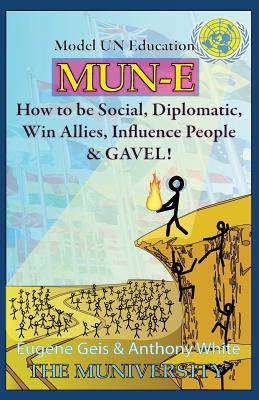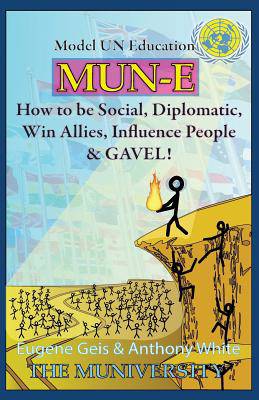
- Retrait gratuit dans votre magasin Club
- 7.000.000 titres dans notre catalogue
- Payer en toute sécurité
- Toujours un magasin près de chez vous
- Retrait gratuit dans votre magasin Club
- 7.000.0000 titres dans notre catalogue
- Payer en toute sécurité
- Toujours un magasin près de chez vous
Mun-E
How to be social, diplomatic, win allies, influence people, and GAVEL!: Model UN Education
Anthony White, Eugene J Geis
Livre broché | Anglais
17,45 €
+ 34 points
Description
The world's most globally informative activity, Model UN [MUN], is more than 50 years old, yet there has never been a book or reference written to explain the process of MUN in a clear and concise fashion, readable for a high school student, until NOW... It is called MUN-E (pronounced "money") and it is a strategy guide for Model UN, educating students on how to portray true value to a room of strangers (other delegates) who are seeking a strong leader to show them what to agree on.After coaching and advising a public high school into Best Delegate's national rankings for multiple consecutive years, Eugene Geis and Anthony White had met enough fresh, new advisors and delegates seeking guidance to master this academic competition. Their book is already in more than 10 countries, proving that leadership can be taught, and it is not merely a result of knowledgeable students promoting consistent international policy. It is rather a combination of a strong, charismatic presence, confidence in one's own ability to communicate, and a personality that exudes tendencies towards rapport, compromise, and effectiveness. This is the true power behind the Diplomat. This book first breaks down the technique for developing a strong presence in and out of committee. It is called "Social Intelligence." Second, they deconstruct the types of delegates encountered at a typical Model UN conference, from the "newbie" to the "gavel hunter." Each type of delegate has positive and negative consequences that require a competitor's attention when forming new alliances. Next, MUN-E shows the reader the philosophical background of arguments, creating a structure that allows a delegate to sculpt any disagreement into a compromise. The sixth chapter shows how to apply these arguments to any of TWELVE award-winning strategies that can be used to solidify a delegate's leadership in any committee! These strategies are drawn from more than 40 years of experience in Model UN competitions.Chapter 7 is a short treatise that breaks down the controversial rules of dress code, demystifying the all-too-common issues resulting from teenagers attempting to dress "professionally." In chapter 8 the fine art of writing position papers and resolutions is presented, using persuasive writing techniques not normally taught in an English classroom. Chapter 9 is the only full discussion of Crisis Committees that can be found printed. Eugene and Anthony's high school delegates were extremely successful in these high-caliber, fiercely competitive situations. Every delegate wishes for a strong introduction to a crisis committee, but usually ends up being chewed up and demoralized in their first experience. This book sets up a framework for preventing such an event.The tenth chapter gives a strong set of tools for developing relationships with other students using the "flexible" rules of social engineering. This material is not for the beginner and holds severe social consequences if used improperly. Keeping ahead of the times, there is a full chapter on creating a FREE wordpress website for a MUN club's management platform. It demonstrates how to integrate it with an existing facebook group and twitter account, maximizing your club's exposure and social media footprint! Finally, the appendices include empirical recipes for research, the full protocol of parliamentary procedures, and a discussion of management techniques for advisors. Model UN is the most difficult liberal arts academic club in high school and the skills that can be learned through Model UN are useful in the broader context of negotiation, social parlance, interviewing, and even collaborative productivity. It should be noted that some of the most successful people in media, business, and leadership have experience competing in Model United Nations. It is one of a few activities that offer full character development along with a global education. This book is, by far, the best primer on this academic activity.
Spécifications
Parties prenantes
- Auteur(s) :
- Editeur:
Contenu
- Nombre de pages :
- 246
- Langue:
- Anglais
Caractéristiques
- EAN:
- 9780985648619
- Date de parution :
- 08-10-12
- Format:
- Livre broché
- Format numérique:
- Trade paperback (VS)
- Dimensions :
- 140 mm x 216 mm
- Poids :
- 290 g

Les avis
Nous publions uniquement les avis qui respectent les conditions requises. Consultez nos conditions pour les avis.






